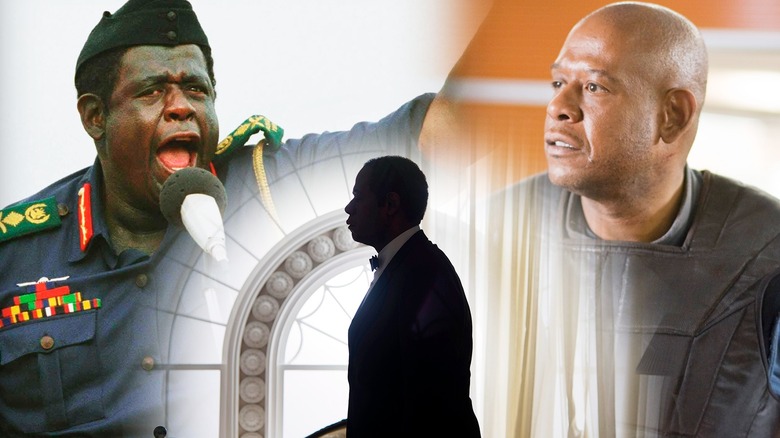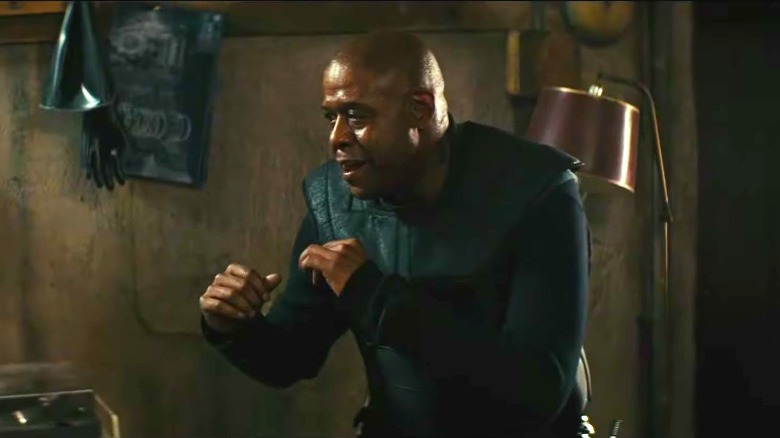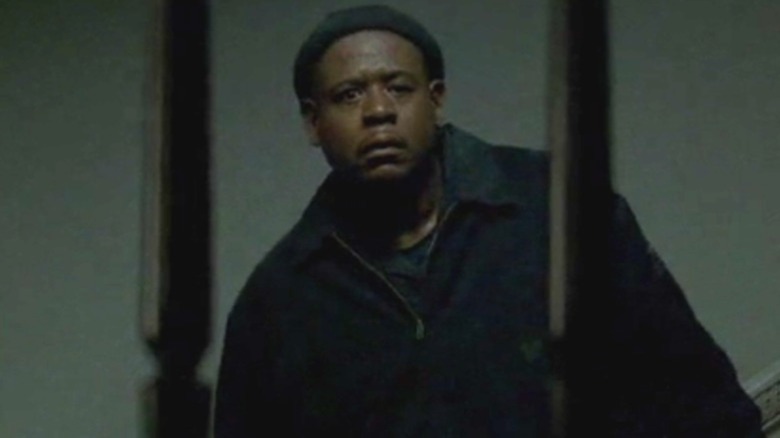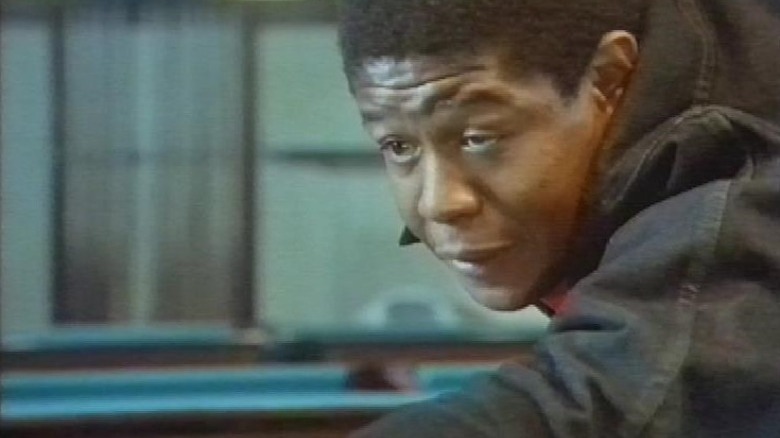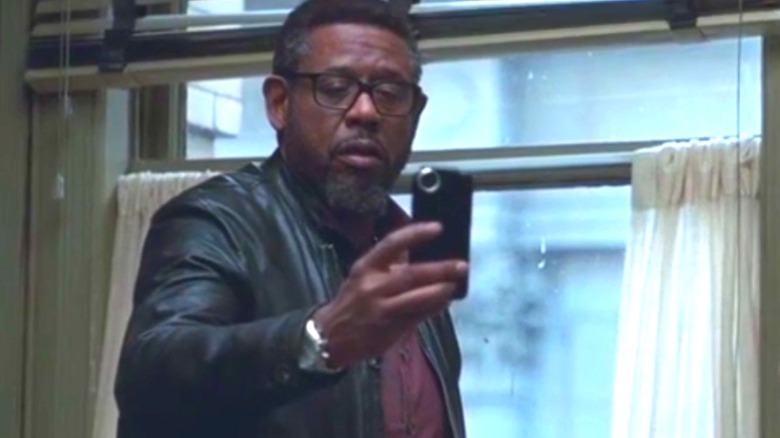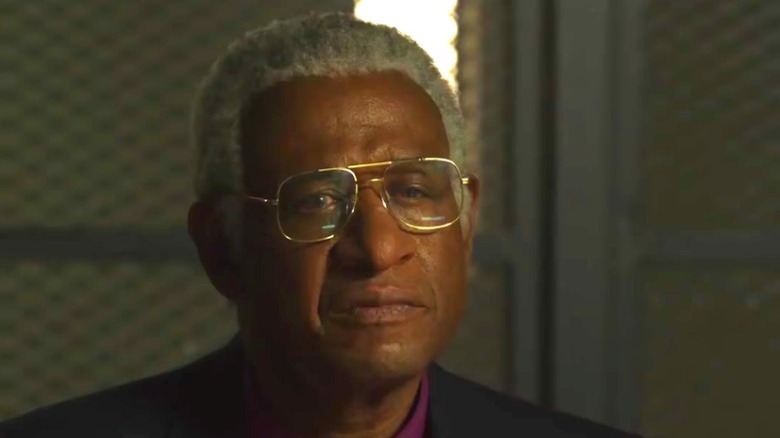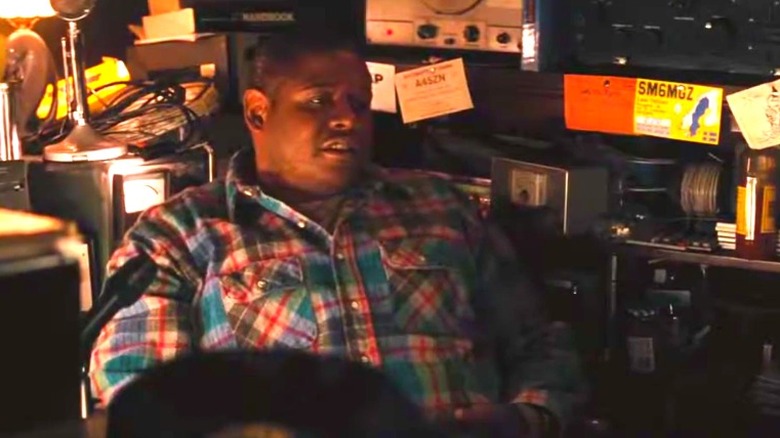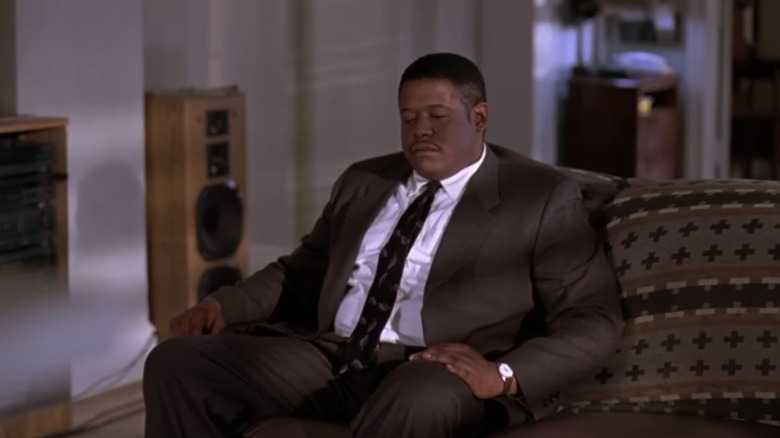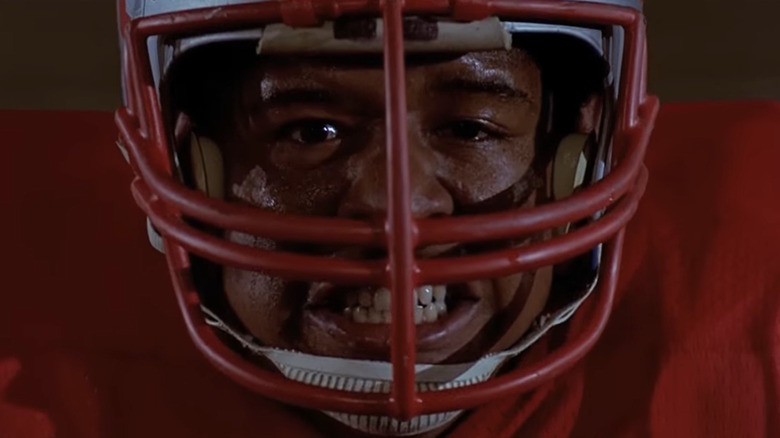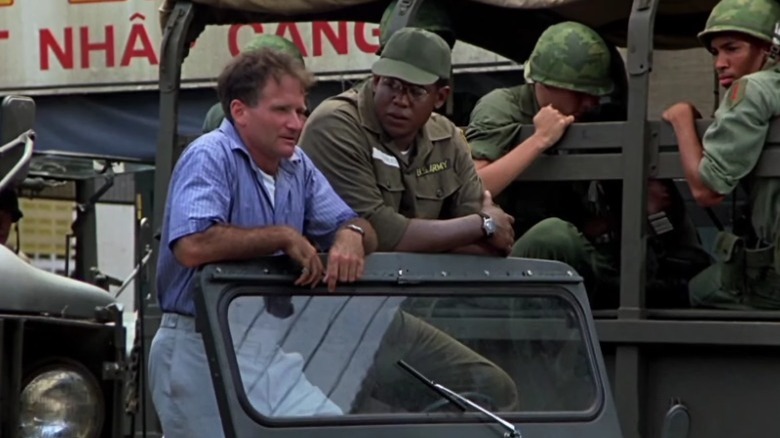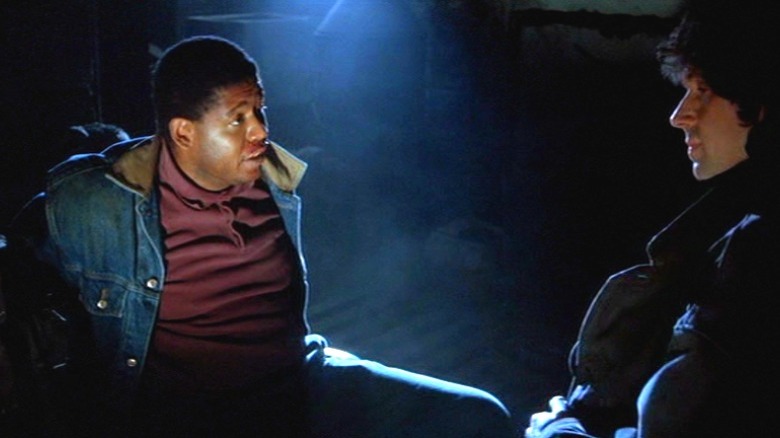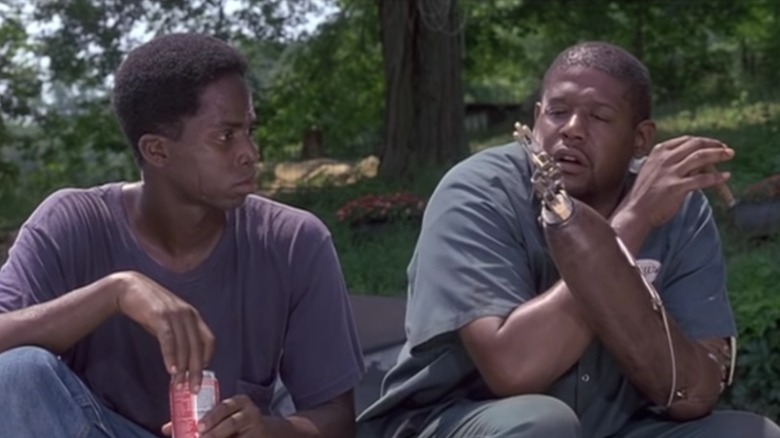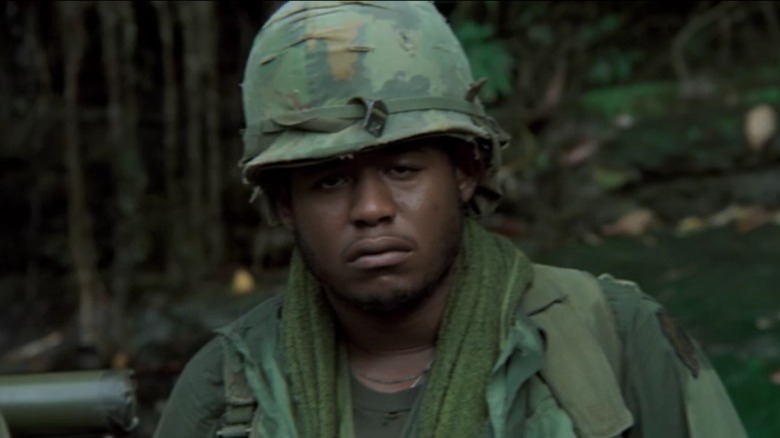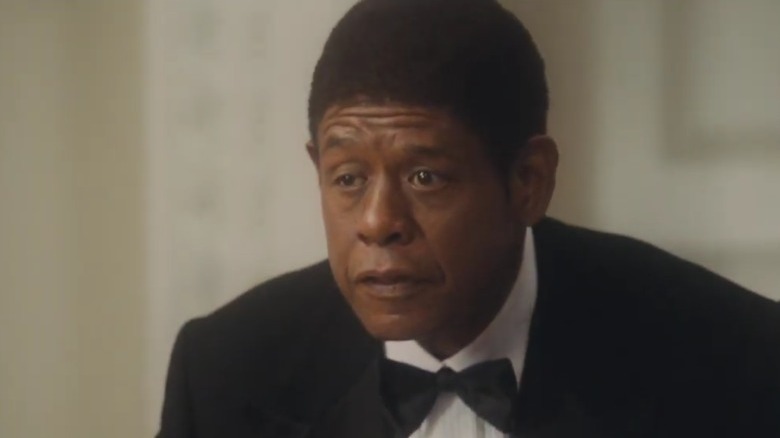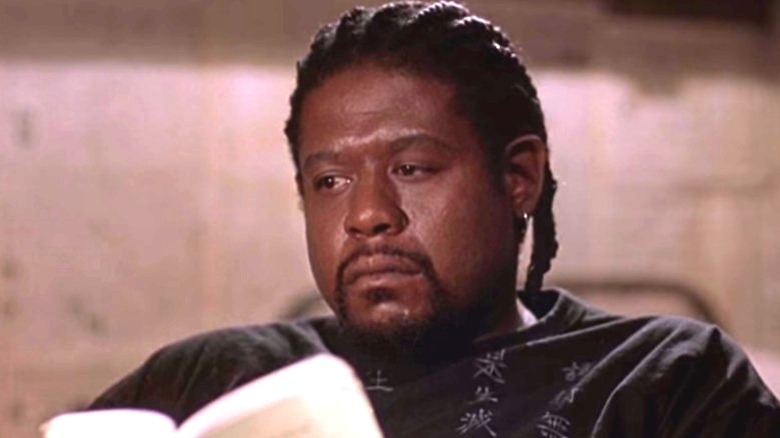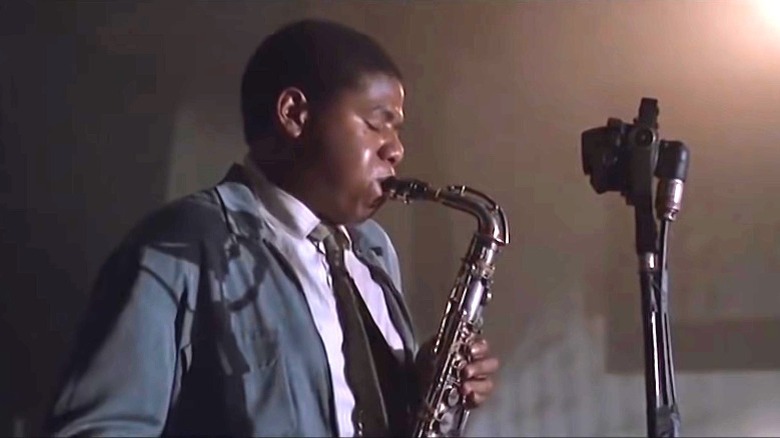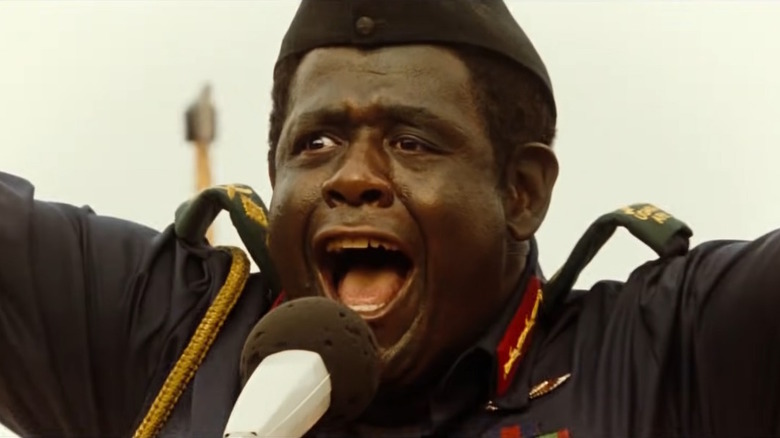16 Best Forest Whitaker Movies, Ranked
Binge-watching your favorite actor's films provides interesting insights into their work. Performance patterns emerge, even with the most varied list of characters. More than anything, this movie-watching experiment gives you a deep sense of an actor's approach to film projects. Very quickly, you realize that some performers treat acting like a job, but the best of the best treat it like a craft.
In modern Hollywood, it's hard to top the acting range of Forest Whitaker, who has taken part in projects ranging from sweeping biopics to gritty thrillers. He has been a television star and a voice actor and has even appeared in music videos. He often plays deceptively simple characters whose strengths lie in their understated but realistic personalities. Whitaker makes every character he plays seem alive — not just within the confines of their respective films, but as though their stories could continue long after the credits roll. His best roles transcend their stories to build a strong connection with viewers.
16. Repo Men
"Repo Men" is by no means a perfect film, but Forest Whitaker's performance as Jake is part of what propels its simple plot forward. Although Jude Law's character, Remy, arguably gets the lion's share of character development, Jake seamlessly serves as a vehicle for his partner's transformation. The two are friends at first, but Jake quickly abandons Remy when he questions his loyalty to their employer. As a result, he precipitates Remy's undoing and nearly ends his friend's life in service of The Union.
Jake is an excellent supporting character, but the part doesn't take full advantage of Whitaker's acting range. Beneath the slick action scenes and fight sequences, his personality is mostly flat. He's likable, but he doesn't reach the multifaceted heights of some of Whitaker's stronger roles. Whitaker doesn't do anything particularly innovative in this film, but he doesn't have to. Jake represents those who remain steadfast in their cause, no matter how flawed it may be. Unfortunately, even his redemptive moments at the film's end aren't enough to make him a more memorable character.
15. Panic Room
"Panic Room" features Forest Whitaker in familiar territory, playing a surprisingly principled criminal. Sure, Burnham breaks into Meg Altman's (Jodie Foster) home after working on her panic room installation, but he still has some sense of decency. He serves as the voice of reason for his band of burglars, who seemingly have no moral compasses. Even in this otherwise straightforward, commercialized thriller, Burnham's character attempts to wrestle with the moral implications of his life choices. Along with Jodie Foster's Meg Altman, he is one of the few genuinely multidimensional characters in the film.
Whitaker often portrays characters who seek redemption — even if it comes at a price. Burnham is no exception, making the ultimate sacrifice in his final choice to save Altman and her daughter. As noteworthy as this character may be, his journey isn't the crux of the film's story. "Panic Room" is decidedly true to its genre, which leaves this character very little room for profound development. The film has an intriguing concept, but that concept outweighs the individual characters.
14. The Color of Money
Forest Whitaker's role in the "The Color of Money" is so brief that his name doesn't appear in the opening credits. However, his character, Amos, represents a pivotal moment in the film's plot. Amos is an amicable amateur who bests Eddie Felson (Paul Newman) in a double-or-nothing game. This minimalist scene focuses on the psychological dance between the seemingly humble young player and the veteran.
In a sense, the dynamic between Amos and Felson reflects that of Whitaker and Newman. "The Color of Money" is the sequel to 1961's "The Hustler," with Newman reprising his role from that film. He's on his home turf, both in the movie's world and as a veteran actor. By comparison, Whitaker was relatively inexperienced and got called to the majors at the 11th hour. As he explained to The Daily Beast, he auditioned for the role with only two weeks' notice. Still, just as Amos proves his skills are on par with Felson's, Whitaker holds his own playing opposite mega-star Newman.
13. City of Lies
In "City of Lies," Darius "Jack" Johnson is everything you'd expect from a journalist. He's persistent, eccentric, and deeply invested in pursuing the truth. More multidimensional than some of Forest Whitaker's other roles, he unpacks the complex mystery of the murders of Tupac "2Pac" Shakur and Christopher "Biggie Smalls" Wallace. Whitaker's chemistry with Johnny Depp, who plays disgraced former LAPD detective Russell Poole, is excellent. The unlikely pair join forces thanks to Johnson's refusal to let Poole's story go unheard.
As with many great supporting characters, Johnson functions as a lens through which the audience views the story. However, that leaves little room for him to shine. "City of Lies" excels at delving into the sweeping history of these infamous murders, but those details sometimes overwhelm Johnson's story. Although Johnson is a solid entry on Whitaker's resume, his tendency to fade into the background makes him somewhat forgettable.
12. The Forgiven
Biographical roles are challenging because there's so much at stake. Depicting a real person's life must be treated more carefully than taking on a fictional character. Of course, good actors capture the heart and soul of the figure they're portraying, but the best actors disappear into these parts and become one with their subject material. Forest Whitaker has an immense talent for accomplishing the latter — as he did in 2017's "The Forgiven."
Whitaker stars as Archbishop Desmond Tutu and does an incredible job of bringing this important historical figure to life. He captures Tutu's mannerisms, inflection, and aesthetics so perfectly that it's easy to forget you're watching an actor and not the real person. Unfortunately, his impressive portrayal gets lost in the film's convoluted plot. Although Whitaker is a highlight, the film is problematic. Taking inspiration from a play about the Archbishop and a South African criminal, the story at the heart of "The Forgiven" is fictional.
11. Phenomenon
Some of Forest Whitaker's best characters are noteworthy for their endearing natures rather than their actions. His "Phenomenon" character, Nate Pope, is the quintessential plucky best friend. Nate supports George (John Travolta) through his transformation from everyman to telekinetic genius. Although not a standout role, the actor's performance as this small-town man is touching. Whitaker has a knack for giving even the most average character a dynamic voice and a realistic range of emotions. Those skills make Pope undeniably relatable.
Ultimately, Nate represents how most of us might handle our best friend going through a significant life change. He worries for George's safety, tries to provide some guidance, and cheers him on every step of the way. He's not only a great supporting character, but he's precisely the kind of friend anyone would be lucky to have. Unfortunately, Nate's story arc is very minimal. Even as he sticks by George's side, he fails to reach the heights of Whitaker's more notable characters.
10. Diary of a Hitman
"Diary of a Hitman" isn't the most remarkable film on Forest Whitaker's resume, but it's a great example of the simple, straightforward dramas that 1990s movie audiences enjoyed. We've heard the story before: A hitman, tired of his line of work, wants to retire — but there's one last job standing between him and a life of peace and quiet. However, with plenty of believable idiosyncrasies and an even-keeled, brutally honest demeanor, Whitaker's Dekker isn't your typical hitman. Leave it to Forest Whitaker to make a criminal seem like someone you'd like to meet.
Dekker is an early example of Whitaker's ability to bring a complex protagonist to life. In the rare instances when Dekker isn't on screen, he serves as the film's narrator. Unfortunately, the film's pacing is a little slow, and the narration sometimes drifts too far into a forced old-timey noir style. Nevertheless, "Dairy of a Hitman" is the perfect movie for anyone who loves seeing Forest Whitaker do what he does best.
9. Fast Times at Ridgemont High
There's something satisfying about re-watching an actor's early roles, especially when they're in great movies. At the beginning of his career, Forest Whitaker played football player Charles Jefferson in the 1980s classic, "Fast Times at Ridgemont High." It's a relatively minor role, but the character is nonetheless memorable. Jefferson is a typical jock who loves winning games, making friends, and caring for his prized Camaro. He also looks out for his younger brother and is very loyal.
In Whitaker's best scene, Jefferson believes students from Lincoln High School vandalized his beloved car. (His little brother and clueless stoner Jeff Spicoli, played by Sean Penn, crashed it on a joyride.) In one of the movie's most hilarious moments, Jefferson takes his rage out on the rival team during the big game. The furious athlete goes on the warpath. Watching Jefferson take a slow-motion flying leap to tackle a Lincoln player is priceless. "Fast Times at Ridgemont High" gives audiences a rare early look at Whitaker's comedic abilities.
8. Good Morning, Vietnam
In "Good Morning, Vietnam," Forest Whitaker appears as radio assistant Edward Garlick. His buttoned-up approach to his work is a foil for Adrian Cronauer's (Robin Williams) on-air antics. Garlick finds Cronauer amusing but also tries to keep him out of trouble. He is both a friend and a fan of the radio host, and the chemistry between Williams and Whitaker makes for heartwarming, hilarious viewing.
Reserved, likable, and well-balanced, the young private is similar to other supporting characters Whitaker played in his early career. However, he has a more substantial character arc, with some measurable growth throughout the film. Garlick's a pleasantly memorable character but not quite as strong as others from Whitaker's later work. His experiences with Cronauer change how he views the world around him for the better, and, in his own quiet way, Garlick helps humanize the larger-than-life DJ. When he takes over the radio broadcast at the movie's end, it feels like his and Cronauer's stories have come full circle.
7. The Crying Game
"The Crying Game" is a classic example of a film that toys with viewer expectations, and Forest Whitaker's character, Jody, seems right at home in its unpredictable atmosphere. He is a kidnapped British soldier who bonds with one of his captors, Fergus (Stephen Rae). The psychology of this friendship is one of the film's high points. Whitaker's Jody draws Fergus into his life story with parables and memories. This character is among Whitaker's most powerful supporting roles because he effortlessly captures the audience's attention in every scene.
The close-up dialogue scenes between the two men represent the best of "The Crying Game" and demonstrate that connections can transcend even the most impossible circumstances. Despite being on opposite sides of the conflict, Jody and Fergus often seem like ordinary men. Whitaker packs tremendous humility and simple charm into his brief time onscreen. His likable nature and ironic, tragic death propel Fergus into the next chapter of his life, but that chapter, unfortunately, overshadows Jody's understated greatness.
6. Smoke
In "Smoke," Cyrus Cole is a successful character because of his tightly packed scenes. Though his story is one of several vignettes, no moment goes to waste. Whitaker expertly conveys this down-on-his-luck mechanic's attitude and emotional state, especially in his single monologue. However, one of the most impressive aspects of Whitaker's work in this role is how the character navigates having a prosthetic arm. He captures both the physicality and the emotional toll that this disability has caused Cole.
Although Cole is cavalier in his early description of his life's biggest mistake, the guilt and shame turn visceral when his storyline reaches its crescendo. Even with minimal time to get to know him, it's easy for audiences to empathize with the intense overflow of emotions he displays when he realizes that a piece of his past has collided with his present. Cole is another excellent example of Whitaker's ability to illuminate the many facets of his characters' personalities.
5. Platoon
"Platoon" is one of the best movies about the Vietnam War ever made. Forest Whitaker's character, Big Harold, isn't the star, but he shines a light on something profound about the world around him. Many other soldiers have moments of anger or hopelessness, but Big Harold spends most of his time going with the flow. As with many of Whitaker's best roles, Big Harold is noteworthy for his understated steadiness.
In a quiet scene, Big Harold responds to deteriorating conditions by saying, "I don't know, brothers, but I'm hurtin' real bad inside." Fellow soldier Junior (Reggie Johnson) briefly looks up in recognition because Big Harold's words reveal the emotional state of the whole platoon. In this perfect moment of introspection, Big Harold speaks to the audience and his platoon mates. His words restore the humanity of the young men around him, many of whom have just committed horrible acts they'd likely never commit in their civilian lives.
4. The Butler
Lee Daniels' "The Butler" is an incredible undertaking that details a White House butler's career across eight presidencies. It's a truly American story that covers some of the most tumultuous decades in U.S. history from a unique perspective. Watching this film reminds us of the power of a strong ensemble cast. Virtually every performance is noteworthy because the actors are deeply dedicated to their historical characters. At its heart is Forest Whitaker as butler Cecil Gaines.
Whitaker portrays Gaines at all stages of his life, even molding his gait and physical mannerisms to match the character's aging process. He also fully inhabits Gaines' emotional world as it shifts from youth to old age. Whitaker is believable at every step of the journey. Unfortunately, the movie didn't receive the Academy Awards recognition we'd expect from a film of its caliber. However, Cecil Gaines remains one of Whitaker's best characters because of how deeply he embeds himself into the humble butler's world.
3. Ghost Dog: The Way of the Samurai
A smooth, calculating hitman and an expert at his craft, Ghost Dog is an excellent character for Forest Whitaker. From his strange rules regarding pay to his reliance on pigeons for communication, Ghost Dog is among the most intriguing characters the actor has played. Ghost Dog is also profoundly philosophical and follows a strict code of ancient ethics. Whitaker seems perfectly at home playing this role, which is no surprise considering its origins. In an interview with Filmmaker Magazine, director Jim Jarmusch explains that he creates characters with particular actors in mind, as was the case with Whitaker and this modern-day urban samurai.
One of the most impressive things about Whitaker's performance in "Ghost Dog: The Way of the Samurai" is how much time his character spends in solitude. It's a film full of quiet moments that require the actor to convey emotions without speaking. Whereas many of Whitaker's low-key characters struggle to stand out in all of their subtly intricate glory, the ever-stoic Ghost Dog takes center stage thanks to the film's tone.
2. Bird
Forest Whitaker has a history of stunning performances in biopics, including his turn as legendary jazz musician Charlie Parker in Clint Eastwood's "Bird." This role was Whitaker's first attempt at portraying a real-life character (and his first outing as a leading man) and proved his dedication to his craft. It's hard to believe Whitaker isn't playing the saxophone himself during the many pivotal performance scenes in the film. He puts an infectious passion into his pantomimed playing that is incredibly convincing.
Whitaker even slightly alters his voice to sound more like the real Parker, adding an extra touch of authenticity to his character. Even those unfamiliar with Parker's story can quickly lose themselves watching Whitaker traverse the saxophonist's story of incredible musical talent and crippling drug addiction. Of all the films Whitaker starred in during the 1980s, "Bird" is the most powerful and best takes advantage of Whitaker's acting skills. He won the 1988 best actor award at the Cannes Festival for this role, marking a major turning point in his career.
1. The Last King of Scotland
Forest Whitaker's role as Idi Amin in "The Last King of Scotland" affirms him as an acting dynamo. Whereas Whitaker's characters are usually more subdued and even-tempered, Amin is a terrifying loose cannon with a knack for cruelty. He's a true cult of personality, and Whitaker makes his every mood and whim feel alarmingly authentic. Amin is arguably the furthest Whitaker has stepped outside himself on screen. He commands attention in every scene.
The most incredible thing about Amin is that, technically, he's a supporting character. We see him through the eyes of his physician, Dr. Nicholas Garrigan (James McAvoy), who is the story's true protagonist. However, in true dictatorial fashion, Whitaker's Amin overshadows everyone around him. He orders brutal executions, expels people from his country, and even takes an entire plane full of people hostage. However, we also see him struggle with feelings familiar to us all — insecurity, fear, and the sting of betrayal. Whitaker infuses this complex character with a deep sense of humanity, which is easily his greatest onscreen accomplishment.
